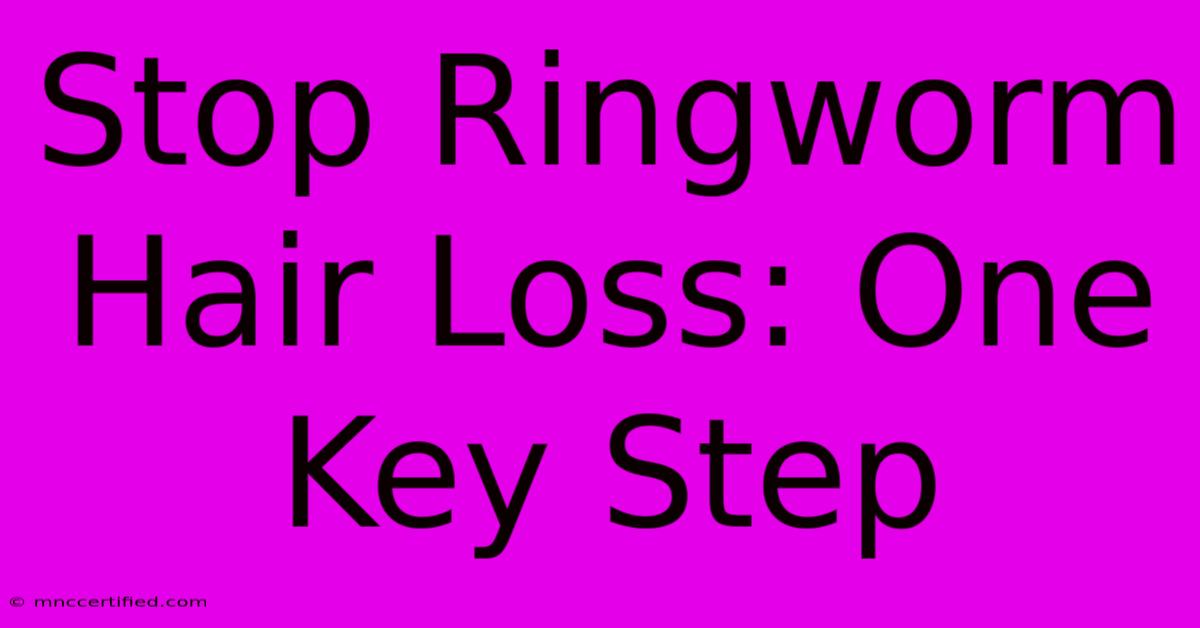Stop Ringworm Hair Loss: One Key Step

Table of Contents
Stop Ringworm Hair Loss: One Key Step
Ringworm, despite its name, isn't actually caused by a worm. This common fungal infection can affect the scalp, leading to hair loss and significant irritation. While frustrating, understanding and addressing the root cause—the fungal infection itself—is the key to stopping ringworm hair loss. This article focuses on that one key step: effective antifungal treatment.
Understanding Ringworm and Hair Loss
Ringworm of the scalp, also known as tinea capitis, manifests as itchy, scaly patches on the scalp. These patches can be red, inflamed, and may lead to hair breakage and loss within the affected area. The hair loss isn't permanent in most cases, but prompt treatment is crucial to prevent further damage and scarring. Ignoring the infection can result in significant hair loss, leaving behind patchy bald spots and potentially impacting self-esteem.
Identifying Ringworm: Symptoms to Watch For
Before we delve into treatment, it's essential to accurately identify ringworm. Common symptoms include:
- Circular, scaly patches: These patches often have a raised, inflamed border.
- Itching: Intense itching is a hallmark symptom.
- Hair loss: Hair within the affected area may break off easily, leading to patchy baldness.
- Black dots: These are broken-off hairs that may be visible within the patches.
- Inflammation: The surrounding skin can be red and swollen.
Important Note: Self-diagnosing can be misleading. If you suspect ringworm, it’s crucial to consult a dermatologist or healthcare professional for a proper diagnosis and personalized treatment plan. They can distinguish ringworm from other scalp conditions with similar symptoms.
The One Key Step: Effective Antifungal Treatment
The cornerstone of ringworm treatment, and the key to stopping hair loss, is the consistent and appropriate use of antifungal medication. This is not something to be taken lightly; improper treatment can prolong the infection and worsen hair loss.
Types of Antifungal Medications:
Several antifungal medications are available, often prescribed based on the severity of the infection and the individual's response. These include:
- Oral Antifungal Medications: These are typically prescribed for more severe cases of tinea capitis and may include medications like griseofulvin or terbinafine. These require a prescription and should be taken exactly as directed by your doctor.
- Topical Antifungal Medications: For milder cases, topical antifungal creams or shampoos containing ingredients like ketoconazole, miconazole, or clotrimazole may be sufficient. These are available over-the-counter but should still be used under the guidance of a healthcare professional.
Adherence to Treatment is Crucial
The success of treatment hinges on strict adherence to the prescribed regimen. Even if symptoms improve, it's vital to complete the entire course of medication as directed to prevent the recurrence of the infection. Stopping treatment prematurely can lead to resistance and prolonged hair loss.
Beyond Treatment: Supporting Hair Regrowth
While antifungal treatment addresses the infection, supporting hair regrowth is also important. This involves:
- Gentle scalp care: Avoid harsh shampoos and styling products that can irritate the scalp.
- Healthy diet: A balanced diet rich in protein and essential nutrients is crucial for hair growth.
- Stress management: Stress can negatively impact hair growth. Implementing stress-reduction techniques can be beneficial.
Preventing Ringworm Recurrence
Ringworm is contagious, so prevention is key. To minimize the risk of recurrence:
- Maintain good hygiene: Regularly wash hair and keep the scalp clean.
- Avoid sharing personal items: This includes hats, combs, brushes, and towels.
- Treat infected pets: Ringworm can be transmitted from pets to humans.
- Boost your immune system: A strong immune system can help prevent infections.
By focusing on this one key step – effective antifungal treatment – combined with preventative measures and supportive care, you can effectively stop ringworm hair loss and promote healthy hair regrowth. Remember to always consult a healthcare professional for proper diagnosis and treatment. Don't delay seeking help; early intervention is crucial for minimizing long-term effects.

Thank you for visiting our website wich cover about Stop Ringworm Hair Loss: One Key Step. We hope the information provided has been useful to you. Feel free to contact us if you have any questions or need further assistance. See you next time and dont miss to bookmark.
Featured Posts
-
Charlotte Crosby Burglary Sunderland Home Targeted
Nov 23, 2024
-
Surprise Kendrick Lamar Drops Gnx Album
Nov 23, 2024
-
My Coldplay Hull Ticket Hunt
Nov 23, 2024
-
Wagners Missed Fts Impact Lakers Game
Nov 23, 2024
-
Tina Turner Country On Acid Queen More
Nov 23, 2024